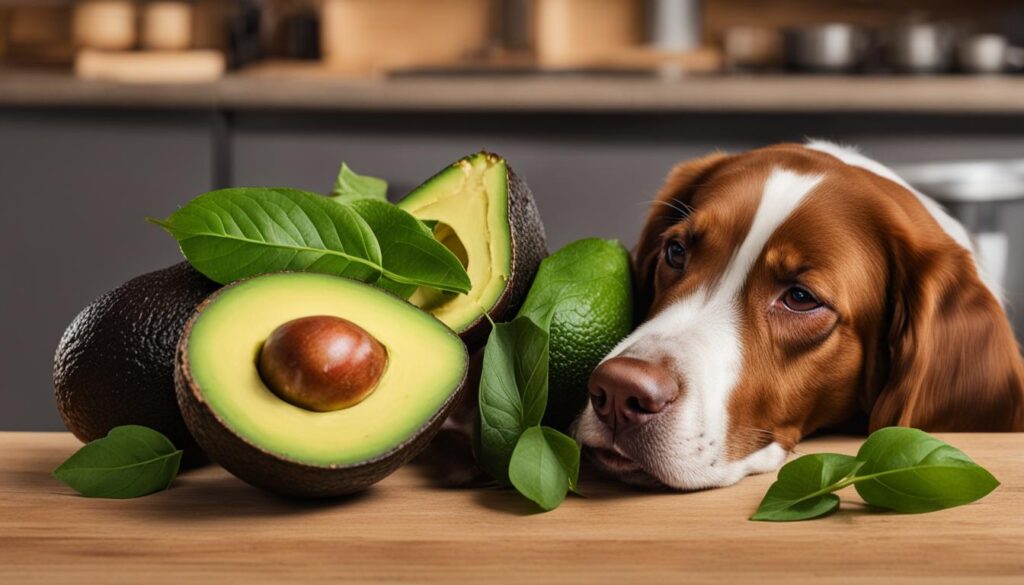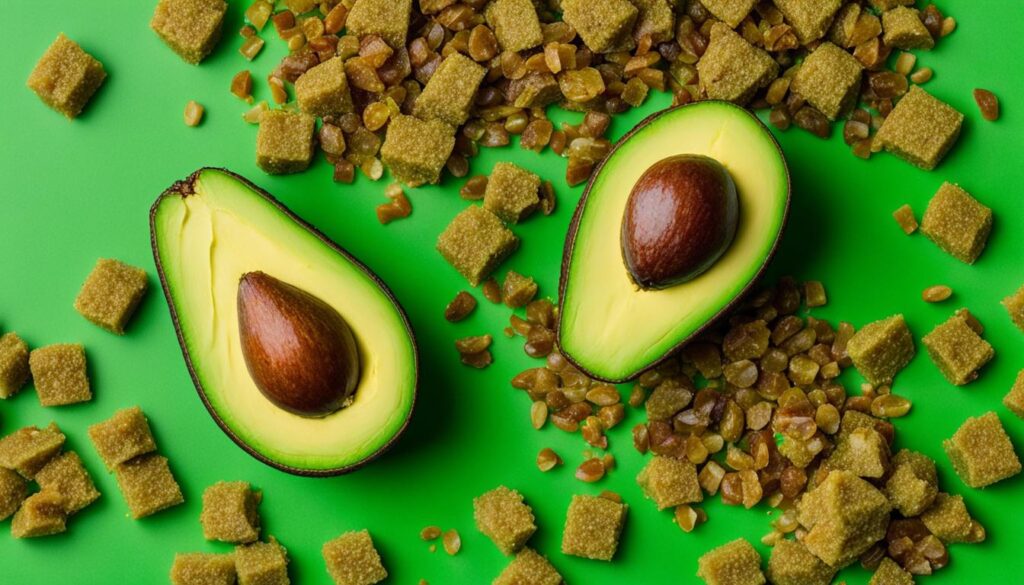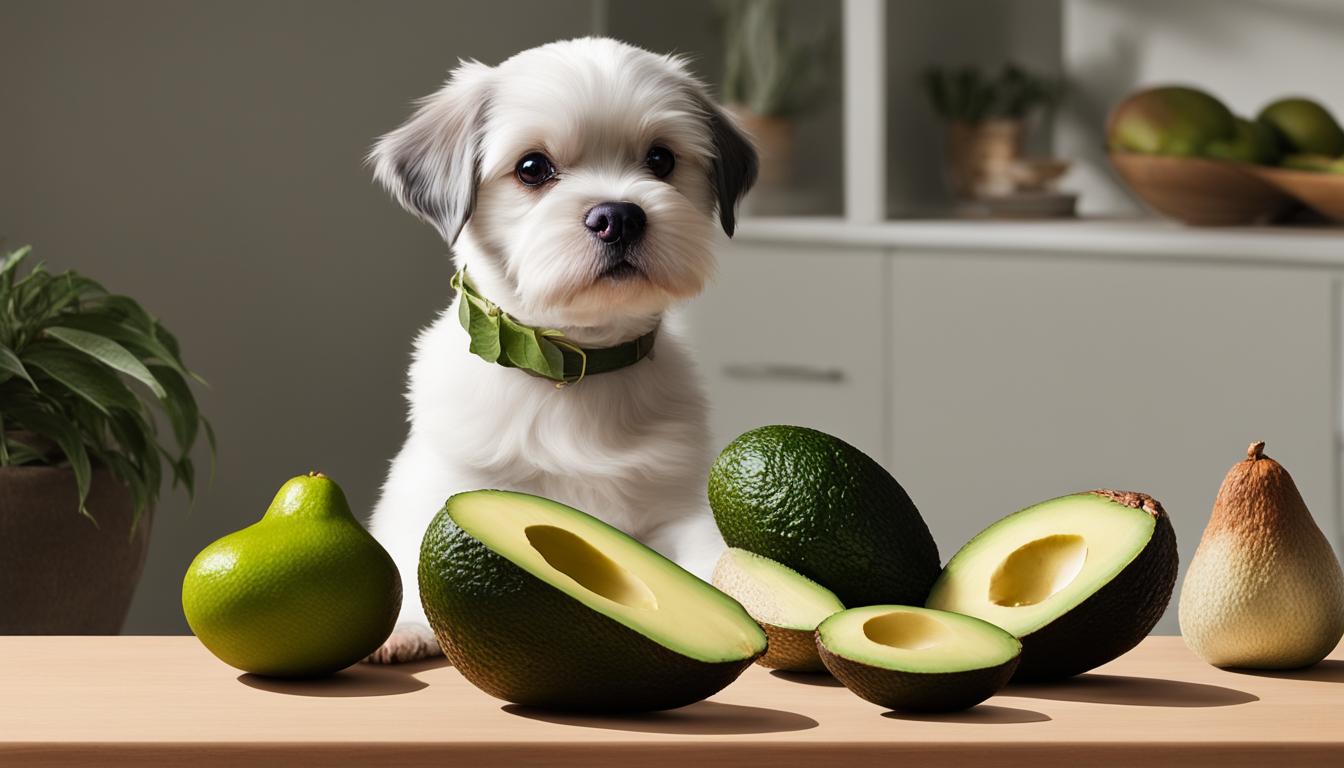Avocado, a beloved fruit among humans, may not be as friendly to our furry friends. As a responsible dog owner, it’s important to understand the potential health risks that avocados pose to dogs.
Avocados contain a toxin called persin, which can cause serious health problems in many animals, including dogs. Not only can avocado flesh lead to gastrointestinal upset and pancreatitis due to its high fat content, but the stone at the center of the fruit also poses a choking hazard.
While dogs may be more resistant to persin than other animals, it’s still best to avoid feeding them avocados altogether. Prioritizing your dog’s digestion and overall well-being means steering clear of this popular fruit.
In this article, we will explore the potential health impacts of avocados on dogs, the risks associated with avocado ingestion, and how to keep avocados away from your furry friends. So, let’s dive in and find out if dogs can safely eat avocado!
Key Takeaways:
- Avocado contains persin, a toxin that can cause serious health problems in dogs.
- The high fat content of avocado flesh can lead to gastrointestinal upset and pancreatitis in dogs.
- Avocado pits can pose a choking hazard to dogs.
- Avoid feeding avocados to dogs and opt for safe alternatives.
- Consult with your veterinarian for guidance on suitable treats and nutritional options for your canine companion.
Can Dogs Have Avocado?
While dogs can technically eat avocados, it’s best to avoid feeding them avocados altogether. Avocado flesh can cause gastrointestinal upset in dogs, leading to symptoms such as vomiting and diarrhea. Additionally, the stone at the center of the fruit poses a choking hazard for dogs. It’s essential to prioritize the safety of your dog’s digestion and overall well-being by steering clear of avocados.
Although dogs may be more resistant to the toxin persin found in avocados compared to other animals, avocados can still pose health risks to dogs. The high fat content of avocado flesh can lead to gastrointestinal upset and even pancreatitis in dogs. Therefore, it’s safer to exclude avocados from your dog’s diet to prevent potential health issues.
To ensure the safety of your furry friend, it’s important to be aware of common foods that are dangerous to dogs. Avocado is one of them due to its potential for causing digestive problems and choking hazards. Instead, focus on providing your dog with a balanced diet that includes safe fruits and vegetables. Consult with a veterinarian for guidance on suitable treats and nutritional options for your canine companion.
“Avocado flesh can cause gastrointestinal upset and the stone at the center of the fruit poses a choking hazard for dogs.”

Avocado in Commercial Dog Food
While direct consumption of avocados can be harmful to dogs, certain commercial dog foods may contain controlled amounts of avocado oil or avocado meal. These products are formulated to minimize any potential risk to dogs’ health. Avocado oil and avocado meal can provide nutritional benefits to dogs, including essential vitamins and fatty acids that support coat and skin health.
| Benefits of Avocado in Dog Food | Potential Risks of Avocado in Dog Food |
|---|---|
|
|
When it comes to commercial dog food containing avocado ingredients, it’s important to remember that moderation is key. Always check the ingredient list and consult with your veterinarian to ensure the right balance of nutrition for your dog’s specific needs.
Potential Health Risks of Avocado for Dogs
While avocado may be a delicious and healthy treat for humans, it can pose various health risks to our canine companions. It’s essential to understand these potential risks to keep our dogs safe and healthy.
Avocado poisoning in dogs
Avocado contains a toxin called persin that can be toxic to dogs. The toxin is present throughout the avocado, including the fruit, pits, leaves, and even the plant itself. If a dog ingests a significant amount of avocado, it can lead to poisoning. Symptoms of avocado poisoning in dogs may include vomiting, diarrhea, abdominal pain, and dehydration. In severe cases, avocado ingestion can even cause myocardial damage, a potentially life-threatening condition affecting the heart.
Avocado and dog weight gain
Avocado is relatively high in fat, which can contribute to weight gain in dogs if consumed in excess. While small amounts of avocado are unlikely to cause significant weight gain, regular consumption of large quantities can lead to obesity. Obesity in dogs can increase the risk of various health issues, including diabetes, joint problems, and heart disease.
Avocado and pancreatitis in dogs
Dogs with pancreatitis have inflamed pancreases, which can cause abdominal pain, vomiting, diarrhea, and loss of appetite. The high-fat content in avocados can potentially trigger pancreatitis in dogs, especially those with a predisposition to the condition. It’s crucial to be cautious and avoid feeding avocados to dogs that have a history of pancreatitis or are at an increased risk of developing the condition.
Given these potential health risks, it’s best to err on the side of caution and avoid feeding avocados to our canine friends. There are plenty of other safe and healthy treats available that can provide similar nutritional benefits without the associated risks. Consult with your veterinarian for guidance on suitable alternatives and a balanced diet to ensure your dog’s overall well-being.
Keeping Avocado Away From Dogs
When it comes to keeping your furry friend safe, it’s essential to take proactive measures to avoid avocado-related incidents. Here are some tips to help you keep avocados away from your dog:
Educate Household Members
Make sure everyone in your household is aware of the dangers of feeding avocados to dogs. Create and display a list of safe fruits and vegetables that can be given to your canine companion. By educating your family members, you can ensure that everyone understands the potential risks and takes steps to prevent accidental avocado consumption.
Invest in a Dog-Proof Garbage Can
If your dog has a tendency to rummage through the trash, consider investing in a dog-proof garbage can. This will help prevent access to potentially harmful foods, including avocado peels and pits. Opt for a sturdy and secure option that will keep your pup safe and your kitchen clean.
Explore Avocado Alternatives
Instead of giving your dog actual avocados, consider exploring alternative treats and products that mimic the look or scent of avocados. For example, you can find fun avocado-shaped dog toys or avocado-scented dog shampoos and detanglers. These alternatives can provide a safe and enjoyable experience for your dog without the potential risks associated with actual avocado consumption.
| Tip | Details |
|---|---|
| Educate Household Members | Ensure everyone knows about the dangers of avocados for dogs and provide a list of safe alternatives. |
| Invest in a Dog-Proof Garbage Can | Prevent your dog from accessing avocados or other potentially harmful foods in the trash. |
| Explore Avocado Alternatives | Find avocado-shaped toys or avocado-scented products to satisfy your dog’s curiosity without the risks. |
By taking these steps, you can ensure that your dog stays safe and healthy, while still enjoying a variety of other suitable treats and toys. Remember, it’s always better to be cautious and proactive when it comes to your pet’s well-being.
Avocado in Commercial Dog Food
While it’s generally recommended to keep avocados away from dogs due to potential health risks, certain commercial dog foods may incorporate avocado oil or avocado meal in their formulations. These products are made with controlled amounts of avocado that do not pose a significant risk to dogs when consumed in moderation. In fact, avocado oil and avocado meal can provide several nutritional benefits to dogs.
The inclusion of avocado oil in dog food can offer a source of healthy fats, such as omega-3 fatty acids, which support coat and skin health in dogs. Avocado oil also contains vitamins A, B6, C, and E, all of which contribute to overall wellness. Additionally, avocado oil contributes to improved digestion, as it is easily absorbed by the body, aiding in the absorption of fat-soluble vitamins and minerals.
Avocado meal, derived from ground avocado meat, is another ingredient that can be found in some commercial dog foods. This meal is high in fiber, which promotes healthy digestion and can help regulate bowel movements in dogs. It also contains essential fatty acids that support joint health and can contribute to a shiny coat. When properly incorporated into a balanced diet, avocado meal can be a valuable ingredient for dogs.
| Benefit | Avocado Oil | Avocado Meal |
|---|---|---|
| Source of Healthy Fats | ✓ | ✓ |
| Vitamins and Antioxidants | ✓ | – |
| Improved Digestion | ✓ | – |
| Joint Health Support | – | ✓ |
| Healthy Coat | – | ✓ |
It’s important to note that the use of avocado in commercial dog food is regulated and carefully controlled to ensure the safety of dogs. However, as with any new food or ingredient introduced to your dog’s diet, it’s advisable to consult with your veterinarian to determine the suitability and appropriate portion sizes for your specific dog.

How to Handle Accidental Avocado Consumption
If your dog accidentally consumes a small amount of avocado flesh, they are unlikely to experience severe symptoms. However, if your dog ingests the skin, leaves, or pit of an avocado, it is essential to monitor them for any signs of distress. Symptoms of avocado ingestion in dogs may include vomiting, diarrhea, and breathing difficulties if the pit is swallowed. Contact your veterinarian immediately for guidance and potential medical intervention if necessary.

To take action after avocado ingestion, follow these steps:
- Observe your dog closely for any unusual behavior or signs of distress.
- If your dog shows symptoms such as vomiting, diarrhea, or difficulty breathing, contact your veterinarian immediately.
- Provide your veterinarian with information about the amount of avocado ingested and any other relevant details.
- Follow your veterinarian’s instructions for monitoring and caring for your dog.
- Do not induce vomiting unless specifically instructed by your veterinarian.
- Keep your dog hydrated by providing fresh water at all times.
It’s important to note that avocado pits can pose a choking hazard to dogs. If you suspect your dog has swallowed an avocado pit, it is crucial to seek veterinary attention immediately. The pit can cause an obstruction in the digestive tract, which requires prompt medical intervention.
| Symptoms of Avocado Ingestion in Dogs | Actions to Take |
|---|---|
| Vomiting | Contact your veterinarian for guidance |
| Diarrhea | Monitor your dog closely for any signs of distress |
| Difficulty breathing (if pit is swallowed) | Seek immediate veterinary attention |
Conclusion
After considering the impact of avocado on dogs, it is clear that caution is necessary when it comes to incorporating this fruit into canine diets. While dogs can technically consume small amounts of avocado flesh, the potential health risks should not be overlooked. Avocado has been known to cause gastrointestinal upset, pancreatitis, and even choking hazards for dogs. Therefore, it is advisable to avoid feeding avocados to your furry companions.
Instead, focus on providing a balanced diet for your dog that includes safe fruits and vegetables. Consult with your veterinarian to ensure you are meeting your dog’s nutritional needs. There are plenty of tasty alternatives to avocado that can be used as dog treats. Explore different options and find what works best for your canine companion.
Remember, the well-being of your dog should always be a top priority. While avocados may be a trendy and delicious treat for humans, it is best to refrain from sharing them with your four-legged friends. Keep their health in mind and opt for safe and nutritious options that will keep them happy and thriving.
FAQ
Can dogs eat avocados?
Dogs can technically eat avocados, but it’s best to avoid feeding them avocados altogether due to potential health risks.
What are the health impacts of avocado on dogs?
Avocado can cause gastrointestinal upset, pancreatitis, and choking hazards in dogs.
Is avocado safe for dogs?
While dogs may be more resistant to the toxin in avocados, avocados still pose health risks to dogs and should be avoided.
What are the potential health risks of avocado for dogs?
Avocado can cause vomiting, diarrhea, and even myocardial damage in dogs. The high fat content can also lead to gastrointestinal upset and pancreatitis.
How can I keep avocado away from my dog?
It’s important to educate your household members about the dangers of feeding avocados to dogs. Consider using a dog-proof garbage can and find alternative treats for your dog.
Does commercial dog food contain avocado?
Some commercial dog foods may contain controlled amounts of avocado oil or avocado meal, which can provide nutritional benefits to dogs.
What should I do if my dog accidentally consumes avocado?
If your dog ingests avocado skin, leaves, or pits, monitor them for any signs of distress and contact your veterinarian immediately for guidance and potential medical intervention.





